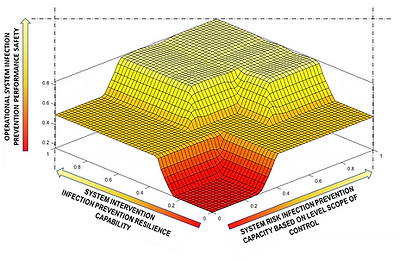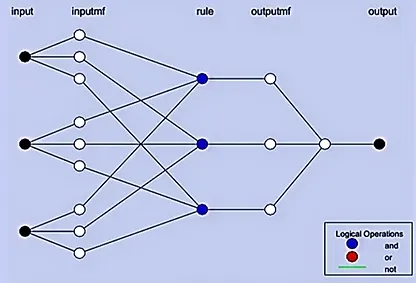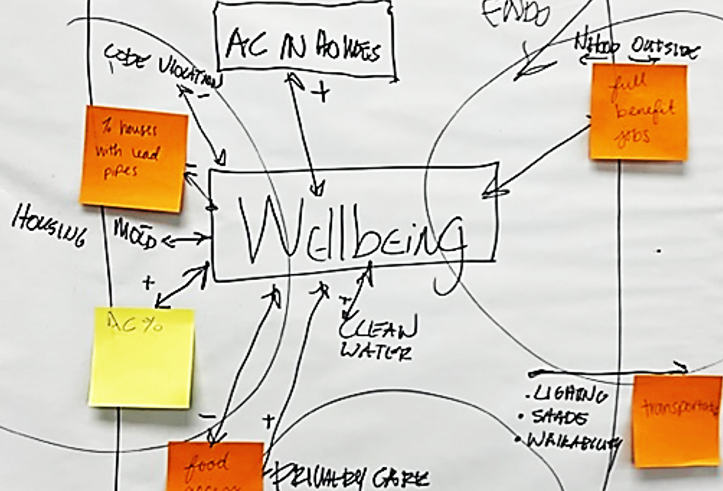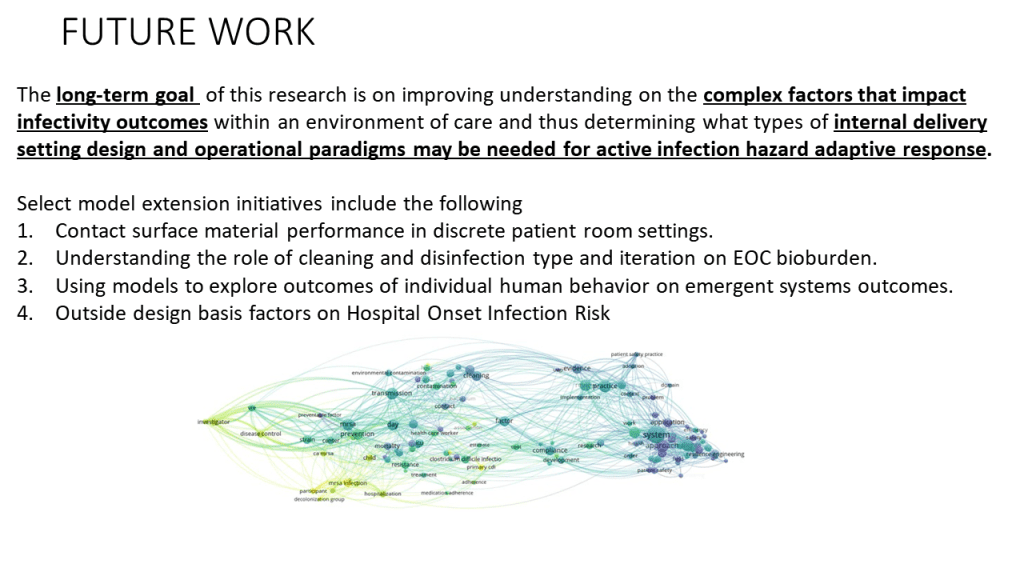OUR PROGRAM
System Risk Detection
Applying socioecological scenario models for a nuanced evaluation of hazards tailored to specific contextual factors.
Design Resilience Performance Forecasting
Employing forward-thinking computational and design methodologies to predict and assess integrative outcomes for both human and environmental factors.
Sustainable Healthy Environments Assessment
Measuring the immediate and lasting effects on public health and well-being through the implementation of regenerative design solutions.
Exploring the Design Resilience of People, Process, and Place
The Design DynamicsLab currently includes a select group of DCP Graduate Research Assistants with research interests in applying AI, Human Factors, and Systems Science methodologies to investigating safety-critical environments.
Presently the lab’s research efforts are focused on improving infection prevention through strategic environmental interventions, using socioecological scenario models for healthy infrastructure planning, and using computational design thinking for environmental predesign.
Projects & Workshops
Resilient Inference System for Performance Safety (RISPS)
Platt, L.S. First Inventor
Human-in-the-Loop (HITL) approach to applied Artificial Intelligence predicts infection-causing risks in inpatient healthcare environments and assesses the effectiveness of infection moderation strategies


Prevention Through Design Environmental Material Intelligence Center (PtD-EMIC)
Platt, L.S. First Inventor
A decision-support tool for assessing interior material performance characteristics related to reducing bacterial bioburden. The system allows users to input performance data that informs design decisions to mitigate infection risk.
Jacksonville, FL – Housing, Environment, and Wellbeing Community System Dynamics Workshop
This two-part community-driven workshop focused on advancing community resilience through watershed planning in at-risk Jacksonville, Florida neighborhoods.
These applied community system dynamics sessions were facilitated by UF DCP FIBER researchers and sponsored by the Jessie Ball DuPont Fund with support from UF Health Jacksonville, LISC Jacksonville, Groundworks Jacksonville, UF City Lab, and the Shimberg Center for Housing Studies.

RESEARCH GALLERY
OUR TEAM

Lisa Platt
IPTD Lab Lead
Lisa is an Engineering Psychologist and Interior Designer using Systems Science to study operations in health and continuing care settings.
Xiaoyu Chen
Lab Member
Milena Rodriguez Mendez
Lab Member
Arezoo Zeinali
Lab Member
PUBLICATIONS
2023
Zeinali, A., Platt L.S. (accepted; publication pending revisions) “An Agent-Based Modelling Approach for Infection Prevention Predesign: Simulating the Spread of Pathogens between Humans and the Environment in an ICU.” Architectural Engineering and Design Management
Platt L.S., Zeinali, A. (under review) “A Primer on Using Complexity Modeling for Safe Healthcare Environment Planning: A Resilience-Based Approach.” Applied Ergonomics
Platt, L.S., Mahmoudi (accepted; publication pending revisions) “Computational Predesign for Evaluating Climate and Community Related Healthcare Infection Risks.” Technology Architecture and Design
L. S. Platt, Xiaoyu Chen, Tara Sabo-Attwood, Nicole Iovine, Scott Brown & Brad Pollitt (2023) Improving infection prevention briefing through predictive predesign: a computational approach to architectural programming by evaluating socioecological risk factors, Architectural Engineering and Design Management, DOI: 10.1080/17452007.2023.2214347
2022
Platt, L.S., Cai, H., Zeinali, A., Green, K., Harvey, J. and Mcintosh, T., 2022, September. Improving Hand Hygiene Compliance through Collaborative Computational Design. In Proceedings of the International Symposium on Human Factors and Ergonomics in Health Care (Vol. 11, No. 1, pp. 98-103). Sage CA: Los Angeles, CA: SAGE Publications.
Platt L.S., Chen X. (2022) A Computational Approach to Estimating Healthcare Contact Surface Material Resilience. HERD. Nov 20:19375867221137098. doi: 10.1177/19375867221137098. Epub ahead of print. PMID: 36408919.
Platt, L.S., Cai, H., Zeinali, A., Green, K., Harvey, J., & Mcintosh, T. (2022). Improving Hand Hygiene Compliance through Collaborative Computational Design. Proceedings of the International Symposium on Human Factors and Ergonomics in Health Care, 11(1), 98–103. https://doi.org/10.1177/2327857922111020
Platt, L.S. (2022) Using Human in The Loop AI Socioecological Modeling for Guiding Infection Prevention Through Design Resilience. Environments by Design: Health, Wellbeing and Place. AMPS Proceedings Series 26.1. ISSN 2398-9467
2020
Platt, L.S., Fronczek A. (2020) Using a Fuzzy Framework for applying King’s Theory of Goal Attainment to Improve Hospital Acquired Infection Resilience. Proceedings of the International Symposium on Human Factors and Ergonomics in Health Care. Sage India: New Delhi, India: SAGE Publications.
Wang, Y., Hao, H., & Platt, L. S. (2020). Examining risk and crisis communications of government agencies and stakeholders during early-stages of COVID-19 on Twitter. Computers in human behavior, 106568.





